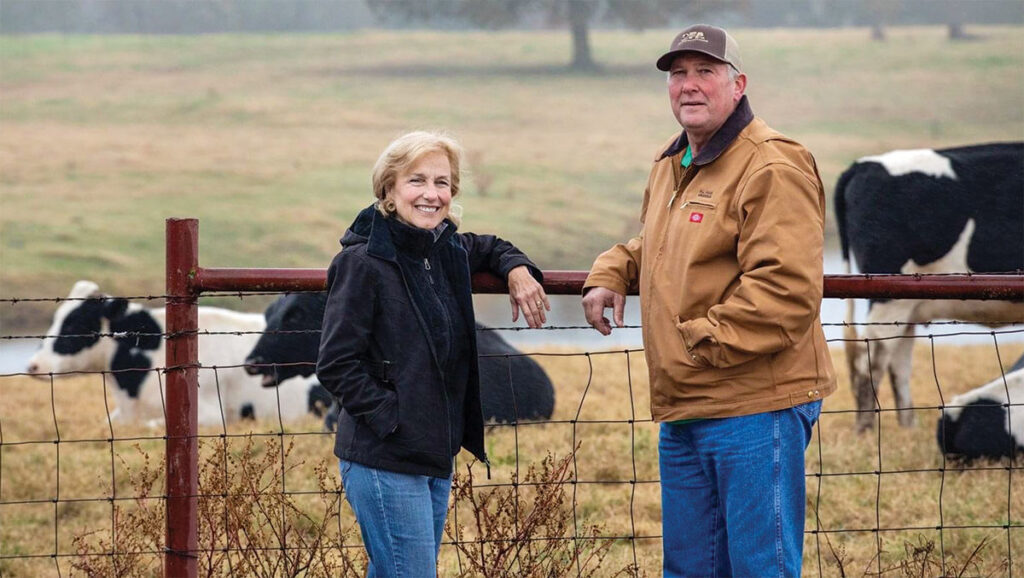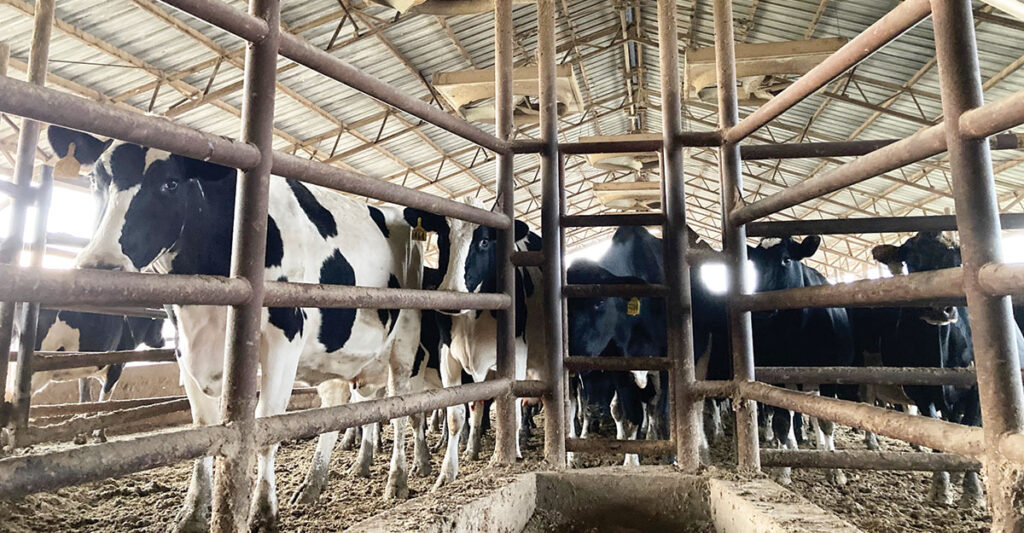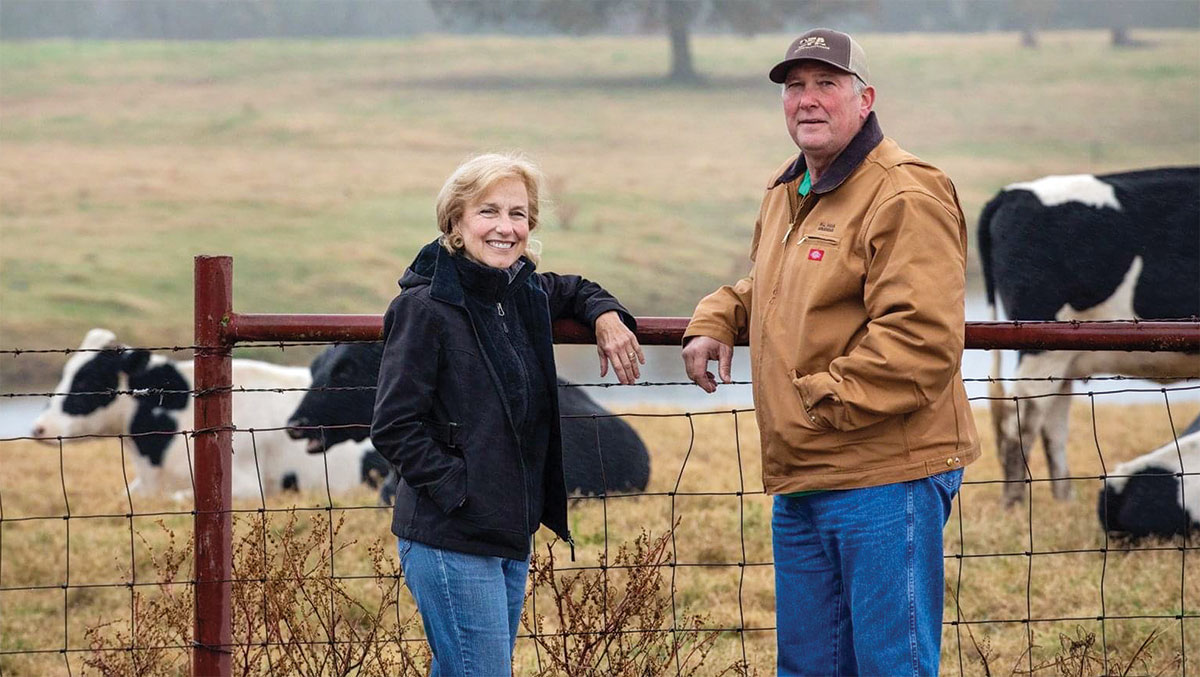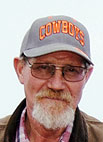
Bill and Delia Haak have operated a dairy farm since 1979
GENTRY, ARK. – Somewhere in the Netherlands, there is a farm with the Haak family name. There are Haaks in various parts of the United States now after their ancestors moved here in the early 1900s.
Bill and Delia Haak live near Gentry, Ark., where they have operated a dairy farm together since 1979. Bill handles the majority of the day-to-day operations while Delia is in the Arkansas Legislature and has a long career as an educator in a variety of capacities.
Although he’s an eighth-generation dairy farmer, Bill and Delia started their farm on their own as his mother had to sell the farm after Bill’s father died in 1975 at age 52.
“(Delia and I) worked together and bought calves. We mortgaged the springers to purchase our first property,” Bill said.
Haak Farm is now 800 acres of both owned and rented land. They manage 130 dairy cattle and have a beef operation from the calves born to the dairy cattle. They also have a sawdust and shavings business to help support poultry growers. Bill says he likes raising “HoJos,” a Holstein/Jersey cross.
“They handle the humidity better, and with the Jersey side, we get more butter fat. The HoJos breed better,” Bill said.
The Haak’s grow their own forage, an ongoing rotation of cool and warm season grasses, and they also roast their own soybeans and cotton seeds. They combine the latter two with a nutritionally balanced pellet to create their own feed mix. Bill said they also feed hay about two months out of the year.
In the approximately four decades of farming, the Haaks have been recognized for their success in a variety of ways. In 2009, they were selected as Benton County Farm Family of the Year. They progressed in the competition that year to ultimately be named the Arkansas Farm Family of the Year.
In 2018, the Haak Farm was chosen as one of 13 Arkansas Discovery Farms through the University of Arkansas Division of Agriculture. The Arkansas Discovery Farms Program reveals “the effectiveness of conservation practices employed at each site,” according to the program website. All 13 sites are privately-owned businesses on which water quality research is conducted. The program’s overarching goal is “to determine the effectiveness of water and soil conservation practices utilized on working farms.”

Bill describes the program as finding practices that hurt and help farms, allowing them to improve. Through the program, ways to better use the ground’s nutrients have been discovered and developed, making the soil practices more ecologically friendly.
“It’s been very educational,” he said. “For the most part, it’s been very positive.”
While he loves that dairy farming is working to be better stewards of the land, he also has concerns about another aspect that is changing in the industry. In the 1980s, there were about 1,300 dairy farms in Arkansas, and now, fewer than 30.
“The industry is going more towards the feedlots and less towards the small farms,” Bill said. “The smaller dairies are declining, and the larger dairies are just getting larger.”
Bill is quick to credit God for the farm’s success, quoting 1 Corinthians 3:7: So neither the one who plants nor the one who waters is anything, but only God, who makes things grow.
“We are aware daily of the Lord’s blessings,” Bill said, adding those blessings include having people with wise business sense cross his path.
While their sons were raised on the farm and continue practicing the strong work ethic they learned during their younger years, they have chosen different career paths. Bill says he knows he is “the eighth and the last” farmer in his family, and talking about it made him reflect on his decades of work and his family heritage. Bill has been on the Benton County Farm Bureau Board for about 30 years, serving as the Arkansas Farm Bureau Dairy Committee Chair.
“We’re trying to make things better for dairy farmers,” he said. “We are trying through legislation to make it more viable financially and environmentally. We are trying to make it more farmer-friendly.”
Consumers also need to be more educated on the impact their purchasing makes on farmers.
“It is concerning to me that consumers find it more appealing to see small dairies existing, but they also like to have the cheap product they can get in the big grocery stores,” Bill said. “It’s both ironic and conflicting.”
The work Farm Bureau does for farmers and the industry at large is what Bill says “is the only voice we have. It’s where we can actually get things accomplished.”
As he looks into the future of his industry, Bill expresses more concerns about the decline of small dairy farms. He also hopes that developments will allow farmers to work less difficult weeks, i.e., “only about 70 hours a week instead of 100 hours a week.”
“Something needs to change,” Bill said. “Farmers need to be able to hire people to help keep the farm going.”
As he reflects on the past and looks to the future, Bill’s comments have a common theme: thankful for the opportunities and challenges. Thankful he’s been able to fulfill promises to his wife and family.
“I’m thankful the Lord has allowed me to do this,” he said.







